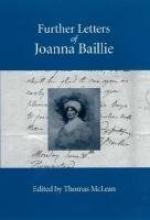|
This section contains 3,772 words (approx. 13 pages at 300 words per page) |

|
SOURCE: "Joanna Baillie and the Counter-Public Sphere," in Studies in Romanticism, Vol. 33, No. 4, Winter, 1994, pp. 559–67.
In the essay below, Mellor argues that Baillie's works offered alternative, feminist views to contemporary readers in place of the commonly extolled views of white middle-class males.
Joanna Baillie was the leading playwright of the romantic era; she was hailed by her peers as the most original and successful of all contemporary dramatists. Sir Walter Scott claimed that Baillie was "certainly the best dramatic writer whom Britain has produced since the days of Shakespeare and Massinger."1 Her competitor, Byron, commented crudely but with admiration, "When Voltaire was asked why no woman has ever written even a tolerable tragedy? 'Ah (said the Patriarch) the composition of a tragedy requires testicles'.—If this be true," Byron continued, "Lord knows what Joanna Baillie does—I suppose she borrows them."2 Byron further declared Joanna Baillie to be...
|
This section contains 3,772 words (approx. 13 pages at 300 words per page) |

|


